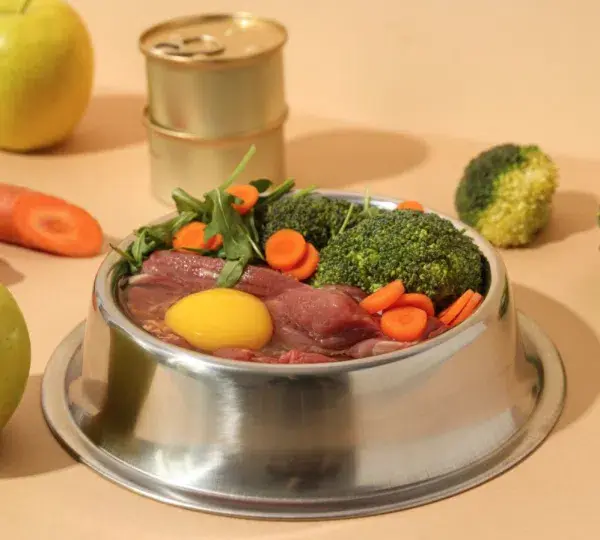The Benefits of Single-Protein Recipes for Pets with Sensitive Stomachs while Travelling
Summary:
- Single-protein recipes support the digestion of pets that have sensitive stomachs, especially in stress-inducing travel conditions.
- When traveling, uniformity in the diet is vital so that the pet can eat without causing gastrointestinal discomfort.
- It is a clean, allergy-free solution, as veterinarians recommend single-protein food and natural food to provide dogs with health and comfort while allowing them to be mobile.
It could be quite an unforgettable experience to take your dog or cat along on your trip; however, it is usually that kind of experience when digestion needs to be managed with great care. The process of traveling also includes some stress factors, such as motion sickness, unfamiliar surroundings, or a sudden change in the schedule, that may disrupt the gastrointestinal (GI) system of a pet. Pets that are already sensitive are even susceptible.
Cue the one-protein recipe: a more streamlined approach to feeding pets that has been catching on with pet nutritionists, as well as veterinarians. They may also be referred to as limited-ingredient diets (LID), and they centre on one animal-based protein source and a minimal number of other ingredients. It is such a clean method which is especially worthy when one is on the move, since the likelihood of gastrointestinal upset, allergic reaction, and allergy is lessened.
Reasons why Travel Makes Pets Have Stomach Aches:
The American Veterinary Medical Association (AVMA) stated that one of the most prevalent health issues of pets on the road is digestive problems. According to a Pet Travel Safety Report of 2022, 41 percent of pet parents noticed vomiting, diarrhea, or changes in appetite in their pets when on vacation.
Travelling is a lousy experience for the animals. It changes routine, causes pets to be subjected to new stimuli, and frequently throws off feeding patterns, remarks Dr. Karen Becker, a holistic veterinarian and author. These stressors, particularly in pets with sensitive stomachs, augment the risk of gastrointestinal upset.
Although motion sickness and anxiety are contributing factors, diet is something that can be controlled, and the pet owner can easily manage using a specific nutrition approach.
What is so good about single-protein recipes?
1. Simplified Digestion:
Most of it, if not all, goes on irritating sensitive stomachs that were already sensitized by the excess ingredients, especially when more than one animal protein is in use. A recipe with only protein is easier to digest, as the GI system assimilates the nutrients without any type of inflammation or reaction.
Tufts University Cummings School of Veterinary Medicine points out that most allergies in dogs and cats to food are caused by their intensified exposure to common proteins such as beef, chicken, or dairy. The best way to curb such reactions is to switch to a limited-ingredient food.
Dr. Donna Raditic, who is a board-certified veterinary nutritionist, remarks that single-protein foods are both a diagnostic and treatment tool. If your pet feels better upon changing, chances are you have found the protein offender.
2. Less Contact with Things that Cause Allergies:
The manifestations of food sensitivities may differ; the dog may constantly itch, have hot spots, regularly have ear infections, and so on. Travelling can exacerbate these when the food ingredients or brands change suddenly.
A 2021 study published in the Journal of Animal Science identified that 25 percent of the dogs with chronic digestive issues showed significant improvement once switched to a single-animal protein diet. Consistency and simplicity are critical when you are on the road.
The decision on Protein: Kind but Nourishing:
The following are some of the top sources of protein, which are commonly available in single-protein meals:
- Duck: Contains a lot of iron and is a new protein to many dogs, thus has a lower risk of causing allergies.
- Turkey: Tastes good, digestible, and low-calorie.
- Salmon: A good source of Omega-3s and aids in inflammation and coat condition.
- Lamb: Can, in many cases, be tolerated by a pet with an allergy to chicken or beef.
- Rabbit or Venison: These are good to feed pets that have severe food allergies, as they are new.
It is not the time to play any games with multi-ingredient food because it can cause miserable travel experiences, says Dr. Sarah Dodd, DVM, and pet food nutrition expert. Pick a food that your pet will already tolerate, but that is preferably a natural dog food containing a novel protein source and using only a single protein.
Natural Food for Dogs:
Several single-protein recipes are also developed into a natural food source for dogs, wherein the ingredients are whole foods that do not contain any artificial flavoring or fillers, as well as by-products. These are meals that more resemble the ancestral diet of a dog and usually include such ingredients as:
- Fiber potato, sweet/pumpkin
- Plant-based sources of nutrients include peas or lentils.
- Healthy fats are kept in the form of coconut oil or flaxseed oil.
The benefit of selecting natural food for dogs is not only having good nutrient absorption but also taking care of the gut microbiome, which plays a vital role in ensuring a balanced immune system during travel stress.
Packaging and Preparation that Works on the Road:
Single-protein and natural food products provided by modern producers are in many forms, optimized to make them travel-friendly:
- Freeze-Dried Patties or Nuggets: Nutrient-rich nuggets or patties that are mess-free and weight-conscious. It is as easy as adding water.
- Single-Protein Meals Canned: They do not perish, and they divide easily.
- Dehydrated Formula: requires little preparation and little space.
- Pre-Portioned meals in pouches: One can use them to measure consumption and pack them in luggage.
When choosing a meal to have during your trip, buy food items with clear labeling. All ingredients that are used should be stated clearly, and there should be only a single source of animal protein. Try to avoid terms such as animal by-products, meat meal, mixed proteins, or poor quality ingredients.
Moving from Small-town to Big-city Tip: Before You Start Driving:
The veterinarians advise the gradual transition of diet to begin at least 7 to 10 days before departure. Start gradually introducing small portions of the new single-protein food into your pet’s usual meal and treat.
Even pets require some time to adapt to a new diet. Dr. Jennifer Coates, DVM, says introducing the new food in phases will prevent a digestive reaction on the first day of your trip.
Another thing is to pack adequate amounts of the same food throughout the journey. Having no gas in the middle of the journey can impose an unanticipated change, which may provoke gastrointestinal problems.
Travel Smarts on Feeding:
When you are on the plane or going anywhere, to guarantee positive outcomes of a single-protein diet:
- Keep to a Routine Feeding: You should ensure your pet follows a pattern in its feeding routine as much as possible to reduce the need for lockdown feedings.
- Consume a lot of Water: Water is particularly significant when it comes to freeze-dried food.
- Serve Mini Frequent Meals: Ding ding ding, better digestion and no more bloat.
- Restrictions on the treats: Limit to food group or single-ingredient snacks (protein).
A regular feeding schedule and natural dog food add to digestive stability, particularly when a dog is under high stress levels.
E-E-A-T: The Expert-Based Nutrition Recommendation:
The E-E-A-T principles developed by Google focus on the importance of well-researched, experience-based content. This is the same when it comes to choosing your pet’s food.
The examples of the trustworthy brands that would match E-E-A-T in pet nutrition are Ziwi Peak, The Honest Kitchen, and Open Farm, which offer:
- Protein certification
- Veterinarian-approved formulations that are batch tested
- The single-protein, clean-label, and natural food-derived options are available.
These are companies offering product traceability and transparency in labeling, giving pet parents peace of mind.
Case of Real Life: Singles of Protein Biography with Restaurants-Changed
Here is the testimony of a dog owner and a camper, Amira J:
“My Golden Retriever, Max, had a history of throwing up during trips. Since we started feeding him freeze-dried duck patties—his single-protein staple—it’s been a game-changer. We pack it in our camping bag, add water, and he stays healthy the entire trip.”
These kinds of results in the real world point to whether diets of single-protein and natural foods can affect turning a nightmare travel experience into a travel experience that is easy and pleasant–for both dog and human.
Conclusion:
In pets suffering digestive problems, the single-protein meals will provide the perfect way of overcoming travel-related digestive woes. Such diets will lower the chances of allergic reaction, make digestion easy, and maintain consistency, a key requirement when in transit.
Single-protein meals, when used together with natural dog food, can keep the gut healthy, but also improve the overall health of the dog. As a good pet parent, one of the most significant things you can do to guarantee your pet’s happy and healthy adventure is by feeding your companion clean, high-quality food, whether you are going on a weekend road trip or a long cross-country trip.
Find restaurants near tourist places





